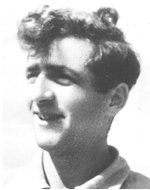Heinz, Abraham Zvi
Son of Sarah-Zelma and Mordechai Martin, was born on November 11, 1919 in the city of Breslau, Germany. Heinz grew up in a traditional home with a strong Zionist connection. After finishing elementary school in his city, he went to a high school named Johannes, many of whose students were Jews. Heinz joined the Habonim organization in his city and as an enthusiastic Zionist youth planned his immigration to Eretz Israel, but decided that he had to learn to be a farmer so that he could bring maximum benefit to Eretz Israel. To this end he began studying at an agricultural school in the city of Alem. His main occupation was growing flowers. Heinz joined the He – Chaluts movement in this school. After two years of study there, his father suggested that he immigrate to Eretz Israel and continue to study at the Mikveh Israel Agricultural School. But the movement decided otherwise and Heinz went with a group of friends to study agriculture, in practice, in Denmark. From there the group immigrated to Israel and joined Kibbutz Shefayim. In 1941 Heinz joined the young kibbutz Sdot Yam where they began to develop the fishing system in Israel. With his arrival in the fields of the sea, Heinz showed dedication, diligence and a rare talent to delve into the mysteries of the new profession. Within a short time, his contribution to the development of fishing techniques was so effective that he became responsible for the Jewish Agency’s “experience” and continued to study fishing and develop new methods. With the outbreak of the War of Independence following the United Nations General Assembly resolution of 29 November 1947 on the partition of the country into two states, when he traveled from Caesarea to Haifa to work on the battleship on the 15th of Shevat 5708 (January 15, 1948), he was hit in the stomach by shots fired at the vehicle he was traveling in . Heinz was silent and did not tell the driver that he had been wounded. Only later, after they were outside the firing zone, he asked to be taken to the hospital where he died. He was brought to eternal rest in the cemetery in Sdot Yam. Survived by a wife, son and daughter, and another daughter – a Holocaust survivor – whom he and his wife adopted, raised and educated with their children. Many articles written in his memory reveal the image of a decent and honest person, whom everyone loved, respected and appreciated.
